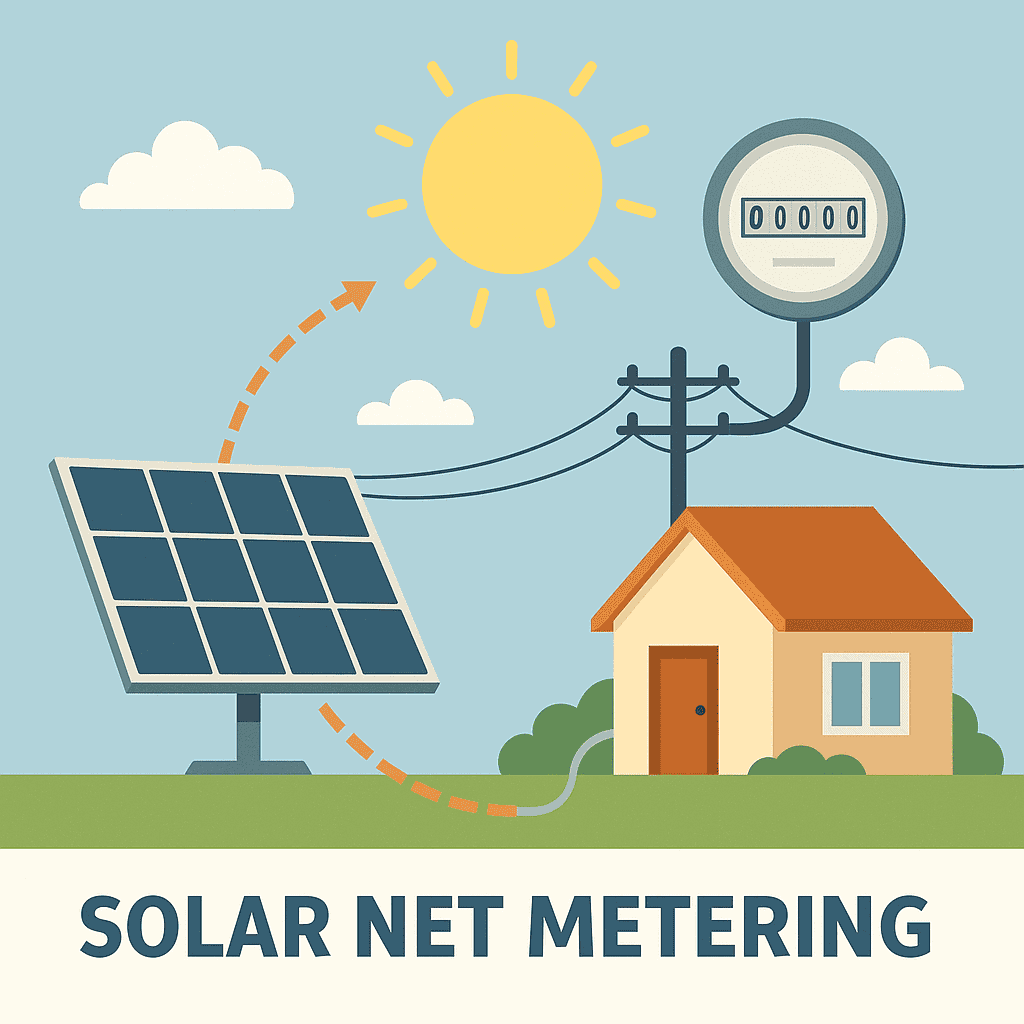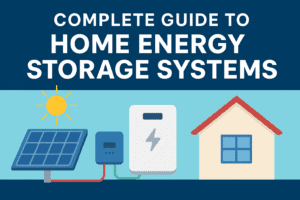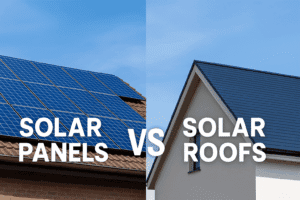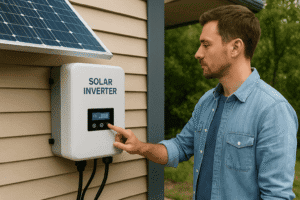How Solar Net Metering Works and Saves You Money
Unlocking the Financial Power of the Sun ☀️
Imagine opening your electricity bill and seeing credits instead of charges. Sounds too good to be true? Not with solar net metering. This game-changing energy policy has transformed the way homeowners think about solar energy, offering not just environmental benefits, but serious financial returns.
In today’s age of skyrocketing energy costs and growing climate concerns, homeowners are turning to solar like never before. But installing panels is just one piece of the puzzle. Solar net metering is what makes solar systems truly cost-effective by allowing you to earn credits for the energy you generate but don’t use.
In fact, homes with solar panels and net metering often experience payback periods as short as 5–7 years, while saving thousands of dollars over the system’s lifetime. But how exactly does it work? What’s the catch? Can you really rely on your utility to give you fair credits? And more importantly, how do you know if solar net metering is available in your state or country?
This comprehensive guide will answer all your questions, debunk the common myths, and help you understand how solar net metering works and saves you money. We’ll also explore how to optimize your energy usage, avoid common energy-wasting mistakes, and integrate smart devices that make your system even more efficient.
Stick around because by the end of this post, you’ll not only understand net metering, you’ll know how to leverage it to cut your energy bills, boost your home’s value, and even start producing a return on your solar investment.
What is Solar Net Metering?
Solar net metering is a billing mechanism that allows homeowners with solar energy systems to feed excess electricity back into the grid and receive credits on their electricity bill. This makes your electricity meter essentially run backward when you’re producing more than you consume.
How Does Solar Net Metering Work?
Here’s how it plays out in simple steps:
- Your solar panels generate electricity during daylight hours.
- If your home doesn’t use all the generated electricity, the surplus is sent to the utility grid.
- Your electricity meter tracks this surplus and gives you credits.
- At night or during cloudy days, you draw electricity from the grid.
- Your credits offset the cost of this usage, reducing your monthly utility bill.
Benefits of Solar Net Metering
- ✅ Significant energy bill savings
- ✅ Faster solar payback period
- ✅ Reduced need for expensive battery systems
- ✅ Encourages energy efficiency
- ✅ Boosts your home’s resale value

Real-Life Example of Net Metering Savings
| Scenario | Without Net Metering | With Net Metering |
|---|---|---|
| Daytime solar production | Wasted unless stored | Sent to grid for credits |
| Monthly electricity bill | ~$180 | ~$40–$60 |
| Payback period | 10+ years | 5–7 years |
| ROI over 25 years | Low | High (up to $30,000 savings) |
Solar Net Metering vs. Battery Storage
While batteries let you store excess energy for nighttime use, they are expensive and require maintenance. With solar net metering, the grid acts as your virtual battery without the upfront cost.
Who is Eligible for Net Metering?
Eligibility varies by location and utility provider, but in general:
- You must own or lease a solar system.
- Your utility must support net metering programs.
- Your system size should align with household consumption (not oversized for profit).
✅ Tip: Check your state’s net metering policy via your local utility’s website.
Which U.S. States Offer the Best Net Metering Programs?
| State | Net Metering Policy | Notable Benefits |
|---|---|---|
| California | Strong | NEM 3.0 with time-of-use credits |
| New York | Excellent | Full retail credit rates |
| New Jersey | Top-tier | Transition Incentive Program |
| Massachusetts | Strong | Smart incentive add-on |
| Arizona | Partial | Export Rate Compensation |
Can You Make Money from Solar Net Metering?
Yes, but not in the way you might think. While you won’t receive a paycheck, your energy bill could shrink to near-zero. And if you generate more than you use over the year, some utilities offer annual cash payouts for surplus energy.
How to Maximize Net Metering Credits
- Use appliances during sunlight hours
- Install smart thermostats to control HVAC efficiently (see our smart home device guide)
- Conduct a DIY Home Energy Audit
- Avoid these common energy-wasting mistakes
- Choose high-efficiency appliances
Net Metering and Time-of-Use (TOU) Rates
In some areas, the value of your net metering credits depends on when you export energy. This is known as TOU pricing. Producing energy during peak hours = higher value credits.
✅ Tip: Use programmable appliances and solar inverters to push power during peak rate periods.
What Happens at Night or in Winter?
Net metering balances out seasonal or hourly usage. In summer, you may generate more than you use. In winter, you may use more than you generate. Over a year, it averages out, your credits can carry forward in many programs.
Is Net Metering Ending? What You Should Know
Some states (like California) are reducing net metering rates to reflect grid costs. However, solar adopters are often grandfathered in under older, more favorable policies. That’s why now is the best time to go solar before rules change.
Do I Need a Special Meter for Net Metering?
Yes. Your utility will install a bi-directional meter that tracks electricity going in and out of your home. This is usually part of the solar setup process and may be covered in your installation cost.
Common Myths About Solar Net Metering
- ❌ Myth: You get paid in cash monthly.
✔️ Truth: You get bill credits, not monthly checks. - ❌ Myth: You still have to buy expensive batteries.
✔️ Truth: Net metering can eliminate the need for batteries entirely. - ❌ Myth: Solar only saves money if you go off-grid.
✔️ Truth: Net metering allows grid-tied systems to be even more cost-effective.
How Solar Net Metering Works with Smart Devices
Combine your solar setup with:
- Smart plugs to control appliance timing
- Energy monitors to track usage patterns
- Smart thermostats for HVAC scheduling
- Home automation to reduce standby losses
Explore our list of best smart home devices for solar users.
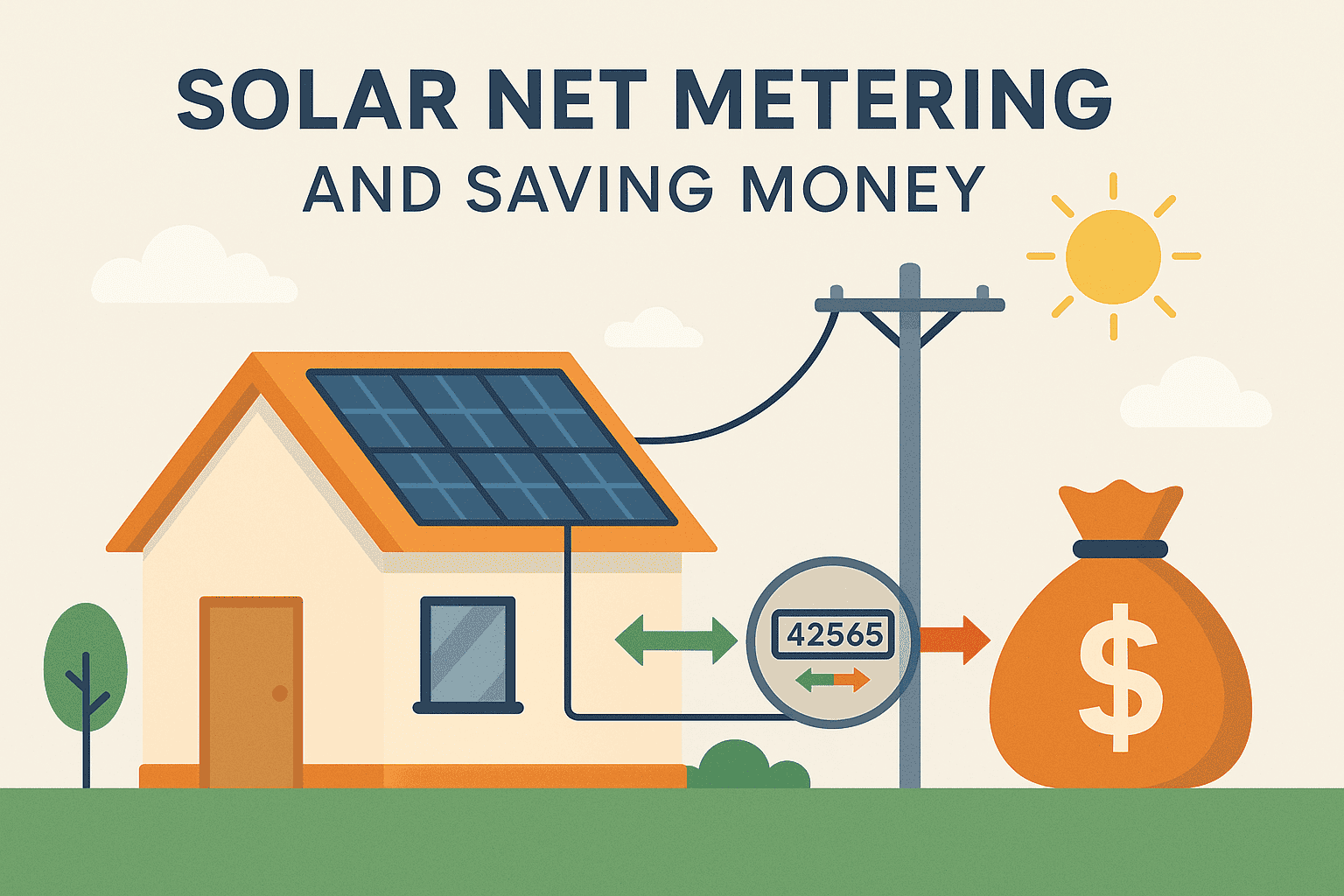
Can Renters Benefit from Solar Net Metering?
Yes, if you’re part of a community solar or virtual net metering program. These allow renters to subscribe to a shared solar array and receive credits on their bill without installing panels.
Conclusion: Is Solar Net Metering Worth It in 2025?
Absolutely! and likely more than ever. As energy prices continue to rise and policies shift toward renewables, solar net metering remains one of the most powerful tools homeowners have to take control of their electricity bills.
By understanding how solar net metering works and saves money, you can:
- Slash your electric bills
- Boost your home’s resale value
- Reduce your carbon footprint
- Gain long-term energy independence
- Make the most of your solar investment
Whether you’re planning to install panels or already have them, knowing how to optimize your usage and maximize your credits is essential. Pair your system with smart tech, stay informed about policy changes, and you’ll keep enjoying the financial benefits of net metering for years to come.
If you’re serious about making your home more energy-efficient, don’t stop here. Check out our full Home Energy Efficiency Guide for 2025 and avoid costly energy-wasting mistakes.
This Post was on How Solar Net Metering Works and Saves You Money

